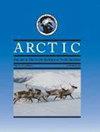阿拉齐亚河:与东北西伯利亚河相连的社会生态系统的变迁
IF 0.8
4区 地球科学
Q4 ENVIRONMENTAL SCIENCES
引用次数: 4
摘要
最偏远的北极地区之一,Yukaghir和Even民族的Andryushkino村位于西伯利亚东北部的Alazeya河岸边,位于俄罗斯萨哈-雅库特的下Kolyma共和国。由于经济转变、永久冻土融化事件和高温,该社区处于大规模北极社会和气候变化的中心。在本研究中,我们通过调查Alazeya河的作用来接近土著对气候对水影响的认识,这条河使人类生活得以繁荣,在过去引起了土著对景观的治理,今天为该地区大多数土著人民的文化、粮食安全和福祉提供服务。为此,我们对流域和社区的社会生态背景进行了雄心勃勃的系统变化分析,通过探索2005年至2020年间社区记录的口述历史,将其与相关科学文献和俄罗斯测量站的天气数据相结合,以检测并指出影响的关键信息。我们的结果证实,自1985年以来,气候变暖的速度和程度有所增加。2007年在该村发生的洪水事件尤其被视为气候变化引发的一场重大灾难。我们专注于从当地历史到现在的变化驱动因素。我们还研究了未来对尤卡吉尔文化、传统生活方式和语言的弹性发展和支持的替代方案。本文章由计算机程序翻译,如有差异,请以英文原文为准。
The River Alazeya: Shifting Socio-Ecological Systems Connected to a Northeastern Siberian River
One of the most remote Arctic locations, Andryushkino village of Yukaghir and Even peoples is located on the shore of the river Alazeya in northeastern Siberia, in the Lower Kolyma Republic of Sakha-Yakutia, Russia. The community is at the nexus of large-scale Arctic social and climate change resulting from economic shifts, permafrost melt events, and high temperatures. In this study, we approach Indigenous knowledge of climate impacts to water by investigating the role of the river Alazeya, which has enabled human life to thrive, given rise to the Indigenous governance of landscapes in the past, and today serves most of the Indigenous peoples in the region for their culture, food security, and well-being. To do this, we offer an ambitious system-change analysis of the socio-ecological context of the river basin and community by exploring oral histories recorded in the community between 2005 and 2020, combining them with relevant scientific literature and weather data from Russian measurement stations to detect and point to key messages of impacts. Our results confirm that the speed and extent of climate warming have increased since 1985. The flood event of 2007 in the village has especially been seen as a major climate change-induced catastrophe. We focus on the drivers of change from local history to present. We also investigate alternatives for future development of resilience and support for the Yukaghir culture, traditional ways of life, and language.
求助全文
通过发布文献求助,成功后即可免费获取论文全文。
去求助
来源期刊

Arctic
地学-环境科学
CiteScore
2.30
自引率
0.00%
发文量
51
审稿时长
6-12 weeks
期刊介绍:
Arctic is a peer-reviewed, primary research journal that publishes the results of scientific research
from all areas of Arctic scholarship. Original scholarly papers in the physical, social, and biological
sciences, humanities, engineering, and technology are included, as are book reviews,
commentaries, letters to the editor, and profiles of significant people, places, or events of northern
interest
 求助内容:
求助内容: 应助结果提醒方式:
应助结果提醒方式:


